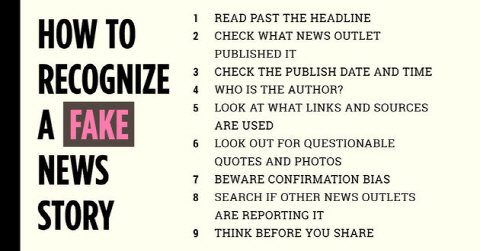
   |

How to Stop the Spread of Fake News
After the election, once it became clear that social media played an oversize role in the viral spread of incendiary fake news — a controversy even President Obama weighed in on — many tech companies vowed to change practices. Both Google and Facebook have pulled their advertising services from fake news sites, but many, including civil rights organizations like the Anti-Defamation League, have demanded more action. What should social media companies do to stop the spread of incorrect information? What is their responsibility as private companies to civic society?
* play a role (in ~) = (~에서) 역할을 하다/ oversize = 너무 큰, 특대의/ viral spread = 바이러스처럼 퍼짐/ incendiary = 자극적인, 선동적인/ controversy = 논란/ weigh in (with/on ~) = (논의·언쟁·활동 등에) 끼어들다[관여하다]; 거들다/ vow = 맹세[서약]하다/ civil rights organization = 민권 단체/ anti-defamation = 반 명예훼손[중상모략]/ civic society = 시민사회(市民社會) ![]() 잘못된 정보의 확산을 막기 위해서 소셜 미디어는 무엇을 해야 하며, 사기업으로 시민사회에 갖는 그들의 책임은 무엇인가요?
잘못된 정보의 확산을 막기 위해서 소셜 미디어는 무엇을 해야 하며, 사기업으로 시민사회에 갖는 그들의 책임은 무엇인가요?
1. Facebook Must Acknowledge and Change Its Financial Incentives
The media industry’s financial dependence on Facebook for content distribution has weakened the reach of solid journalism. Facebook must now own the fact it is a major news distributor.
2. Algorithms Could Help Social Media Users Spot Fake News
A simple warning that labels content from a suspicious URL or source as untrustworthy could be the first line of education for those who want to help stop the spread of fake news.
3. Users Must Be More Critical of Online Content
Nefarious actors, like ISIS and neo-Nazis are thriving in the democratization of social media. As users, we need to take more responsibility for the content we read and share.
4. Social Media Companies Need to Hire Human Editors
There is no purely algorithmic process that can infer truth from lies, and there will always be individuals who game the system for their own gain.
Sample Essay
Facebook Must Acknowledge and Change Its Financial Incentives
The problem of “fake news” is not necessarily a problem of technology. Rather, it is linked to the economic and organizational incentives behind Facebook’s News Feed algorithm.
For Facebook to fully tackle fake news, it must acknowledge that financial and political incentives drive the company to privilege the act of sharing over dissemination of truthful coverage. Facebook also must own the fact that it is now a major news distributor. It doesn’t need to just tweak its algorithm, it needs to tweak its business practices and objectives.
In the last few decades, technology companies have boasted about their "disruption" of industries like the news media. Now that the consequences of this disruption are becoming clear, platforms have a responsibility to engage on an ongoing basis with domain-experts, such as legacy media organizations and professionals, to learn about journalistic ethics — and preserve them.
The news media industry’s financial dependence on Facebook for content distribution has, in many cases, weakened the reach of solid journalism. The idea that the role of journalism now is to "give people what they want" or "what matters to them" has become embedded in the same logic that drive Facebook’s algorithmic personalization and ad-targeting products.
Media organizations were especially left behind when Facebook changed its algorithm in June to privilege friends and family over major publishers, which happens to have occurred just prior to the spike in fake news before the election.
Facebook must create institutionalized pathways for journalists and policymakers to help shape any further changes to the algorithm. First steps could include more transparency about the business model driving these changes, incorporating opportunities for comment from members of civil society and the news industry, and creating an internal team dedicated to media ethics concerns, with an explicit mission statement driven by values rather than increasing clicks and views.
In the U.S., where the authority of traditional media institutions have been on the wane since the rise of the cable news era, turning to the Federal Communications Commission for regulation may not prove effective. However, Facebook is a global company, and other countries, such as Germany, are becoming concerned about the potential for Facebook to influence their own political process.
The United States and other countries may be able to mobilize policies and commissions used in the broadcast and cable eras to emphasize media diversity, impartiality and accuracy, but ultimately it is incumbent on Facebook to change its business model.
   |




